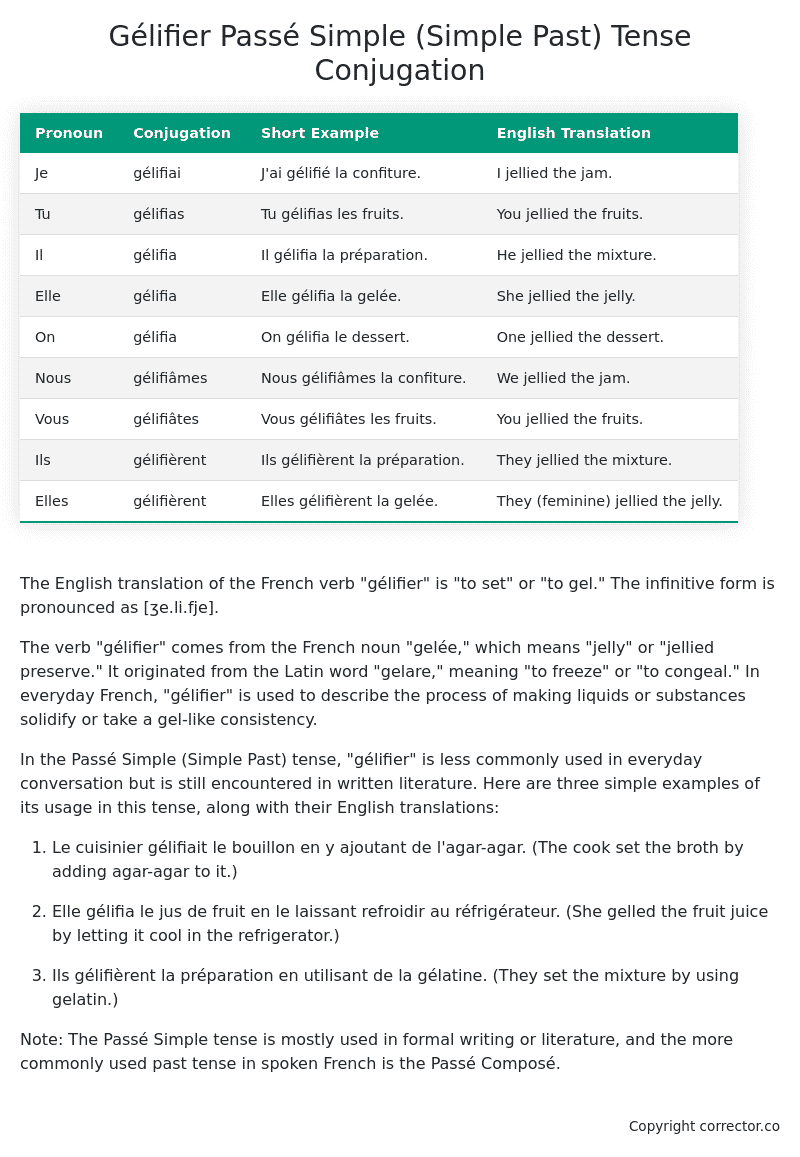Passé Simple (Simple Past) Tense Conjugation of the French Verb gélifier
Introduction to the verb gélifier
The English translation of the French verb “gélifier” is “to set” or “to gel.” The infinitive form is pronounced as [ʒe.li.fje].
The verb “gélifier” comes from the French noun “gelée,” which means “jelly” or “jellied preserve.” It originated from the Latin word “gelare,” meaning “to freeze” or “to congeal.” In everyday French, “gélifier” is used to describe the process of making liquids or substances solidify or take a gel-like consistency.
In the Passé Simple (Simple Past) tense, “gélifier” is less commonly used in everyday conversation but is still encountered in written literature. Here are three simple examples of its usage in this tense, along with their English translations:
-
Le cuisinier gélifiait le bouillon en y ajoutant de l’agar-agar.
(The cook set the broth by adding agar-agar to it.) -
Elle gélifia le jus de fruit en le laissant refroidir au réfrigérateur.
(She gelled the fruit juice by letting it cool in the refrigerator.) -
Ils gélifièrent la préparation en utilisant de la gélatine.
(They set the mixture by using gelatin.)
Note: The Passé Simple tense is mostly used in formal writing or literature, and the more commonly used past tense in spoken French is the Passé Composé.
Table of the Passé Simple (Simple Past) Tense Conjugation of gélifier
| Pronoun | Conjugation | Short Example | English Translation |
|---|---|---|---|
| Je | gélifiai | J’ai gélifié la confiture. | I jellied the jam. |
| Tu | gélifias | Tu gélifias les fruits. | You jellied the fruits. |
| Il | gélifia | Il gélifia la préparation. | He jellied the mixture. |
| Elle | gélifia | Elle gélifia la gelée. | She jellied the jelly. |
| On | gélifia | On gélifia le dessert. | One jellied the dessert. |
| Nous | gélifiâmes | Nous gélifiâmes la confiture. | We jellied the jam. |
| Vous | gélifiâtes | Vous gélifiâtes les fruits. | You jellied the fruits. |
| Ils | gélifièrent | Ils gélifièrent la préparation. | They jellied the mixture. |
| Elles | gélifièrent | Elles gélifièrent la gelée. | They (feminine) jellied the jelly. |
Other Conjugations for Gélifier.
Le Present (Present Tense) Conjugation of the French Verb gélifier
Imparfait (Imperfect) Tense Conjugation of the French Verb gélifier
Passé Simple (Simple Past) Tense Conjugation of the French Verb gélifier (You’re reading it right now!)
Passé Composé (Present Perfect) Tense Conjugation of the French Verb gélifier
Futur Simple (Simple Future) Tense Conjugation of the French Verb gélifier
Futur Proche (Near Future) Tense Conjugation of the French Verb gélifier
Plus-que-parfait (Pluperfect) Tense Conjugation of the French Verb gélifier
Passé Antérieur (Past Anterior) Tense Conjugation of the French Verb gélifier
Futur Antérieur (Future Anterior) Tense Conjugation of the French Verb gélifier
Subjonctif Présent (Subjunctive Present) Tense Conjugation of the French Verb gélifier
Subjonctif Passé (Subjunctive Past) Tense Conjugation of the French Verb gélifier
Subjonctif Imparfait (Subjunctive Imperfect) Tense Conjugation of the French Verb gélifier
Subjonctif Plus-que-parfait (Subjunctive Pluperfect) Tense Conjugation of the French Verb gélifier
Conditionnel Présent (Conditional Present) Tense Conjugation of the French Verb gélifier
Conditionnel Passé (Conditional Past) Tense Conjugation of the French Verb gélifier
Conditionnel Passé II (Conditional Past II) Tense Conjugation of the French Verb gélifier
L’impératif Présent (Imperative Present) Tense Conjugation of the French Verb gélifier
L’impératif Passé (Imperative Past) Tense Conjugation of the French Verb gélifier
L’infinitif Présent (Infinitive Present) Tense Conjugation of the French Verb gélifier
L’infinitif Passé (Infinitive Past) Tense Conjugation of the French Verb gélifier
Le Participe Présent (Present Participle) Tense Conjugation of the French Verb gélifier
Le Participe Passé (Past Participle) Tense Conjugation of the French Verb gélifier
Struggling with French verbs or the language in general? Why not use our free French Grammar Checker – no registration required!
Get a FREE Download Study Sheet of this Conjugation 🔥
Simply right click the image below, click “save image” and get your free reference for the gélifier Passé Simple tense conjugation!

Gélifier – About the French Passé Simple (Simple Past) Tense
Formation
Usage
Narration
Historical Context
Interactions with other tenses
Passé Composé
Imparfait
Conditional and Subjunctive
Summary
I hope you enjoyed this article on the verb gélifier. Still in a learning mood? Check out another TOTALLY random French verb conjugation!


